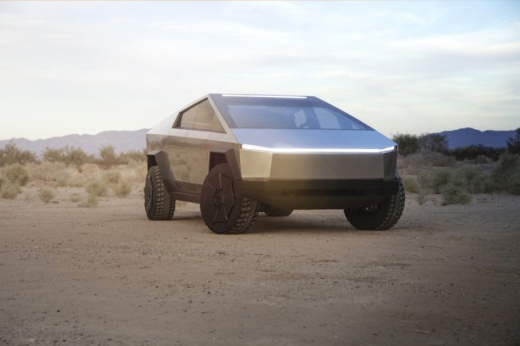Travis County held its first public discussion about a plan to incentivize electric automaker Tesla’s option to build a local gigafactory on June 23, with commissioners hearing presentations from company representatives and county staff as well as comments from dozens of community members.
Tesla’s proposed 4-5 million-square-foot plant would manufacture the new Cybertruck, among other Tesla models, at a site near Del Valle in Austin's extraterritorial jurisdiction.
While commissioners did not take a vote on the proposed economic incentives, Travis County Judge Sam Biscoe said a vote could come as soon as June 30.
Behind the deal
Travis County staff have proposed a 20-year economic incentives agreement with Tesla, according to Diana Ramirez, Travis County director of economic development & strategic investments . For the first 10 years of Tesla’s tenure in the area, the company would receive an 80% rebate on property tax payments, amounting to a projected $14.65 million over that time period. Tesla would have to pay around $21.7 million in property taxes over 10 years to Travis County up front, but would receive the pre-agreed rebates pending a third-party compliance review. For the following 10 years, Tesla would be eligible for a 65% rebate.
Staff emphasized that the county would still see a net fiscal benefit of roughly $7 million following the execution of a potential economic incentive agreement. Additionally, the agreement would require Tesla to commit to spend 10% of rebate value on local programs that would benefit the community, with possible options for investment including Workforce Solutions, Austin Community College, Travis County Justice Planning and Capital Metro.
In order to secure Tesla’s commitment to the area, company representatives have emphasized the need for significant economic incentives like the one proposed by Travis County to offset Texas’ high property taxes compared to other states, such as Oklahoma, which Tesla is also considering for the new gigafactory.
“Compared to most other states, you’ve got high property taxes in Texas, sometimes presenting barriers to large investments. That’s especially true for businesses like Tesla with extremely high machinery and equipment costs,” said Rohan Patel, Tesla senior global director of public policy and business development. “The incentives here in Texas and in Travis County would not be a reason for us to choose this location or Texas, but they are a prerequisite to make the economics of a factory work.”
With plans to add around 5,000 medium-skilled jobs to the area, Tesla’s proposed project comes at a time when the Austin metropolitan area is experiencing significant job loss due to the coronavirus pandemic. Figures from the Bureau of Labor Statistics cite more than 135,000 leisure and hospitality jobs alone as being eliminated in the Austin MSA between February and April 2020.
“In terms of timeliness, given where things are, it not only speaks to [Travis County's] long term structural needs, but our short term pandemic needs, and that’s pretty powerful,” County Consultant Jon Hockenyos said.
Residents discuss employee protections
Numerous callers from the public expressed skepticism that Tesla could be trusted to uphold its end of this bargain, citing CEO Elon Musk’s disputes with Alameda County, Calif. when Tesla was ordered to close its Fremont facility in light of coronavirus restrictions in May.
Others said the company’s salary and benefit promises for the new factory fall short. Tesla has said the average salary for workers at the new plant would be $47,147, with a minimum hourly wage of $15/hour.
Precinct Four Commissioner Margaret Gomez also spoke to these concerns, emphasizing her desire to see Tesla invest in affordable housing options in the area.
“At the pay of $47,000 that we have seen from your proposal, I don’t even think that would come close to them being able to afford to buy a house [in Southeast Travis County],” Gomez said.
Gomez also advocated for the creation of a union for employees of the new facility. Tesla representatives have touted the availability of entry-level jobs for recent high school graduates, who Gomez observed to be vulnerable and in need of workplace guidance and protections.
Patel said it was up to employees whether to seek out union representation, but local union leaders who spoke during public comment—including a representative from United Auto Workers, which has sought to unionize Tesla employees in the past—were quick to point out Tesla’s history of union conflicts. Those include a tweet by Musk that the National Labor Relations Board said violated labor law for implying that unionized workers would sacrifice company stock options.
Many other callers, however, championed Tesla’s potential move to the Austin area, including Tesla employees pleased with the carmaker’s labor practices. Carlos Cervantes, a manager for Tesla’s dealerships in Austin and San Antonio, credited the company as a source of growth and opportunity for area workers.
“I’ve watched technicians grow and become high-level diagnostic engineers. I’ve watched advisors become managers, and car washers become Tesla technicians,” Cervantes said.
Next steps
According to Biscoe, a vote could take place at a meeting next week if commissioners feel confident in doing so. Del Valle ISD, which is also considering an economic incentives agreement with Tesla, will also hold a public hearing regarding Tesla’s potential plant on June 25.
Even if Travis County and DVISD vote to offer Tesla significant economic incentives, the company may opt for another location. However, Patel did tell commissioners that the Austin area was a preferred location for several reasons, including the availability of a diverse workforce in demographic, education and skill. To that end, he said Tesla looked forward to a strong partnership with DVISD, which could offer an employment pipeline for recent graduates, teacher externships and more benefits, and with Huston-Tillotson University, which Patel called “a jewel in Austin.”





